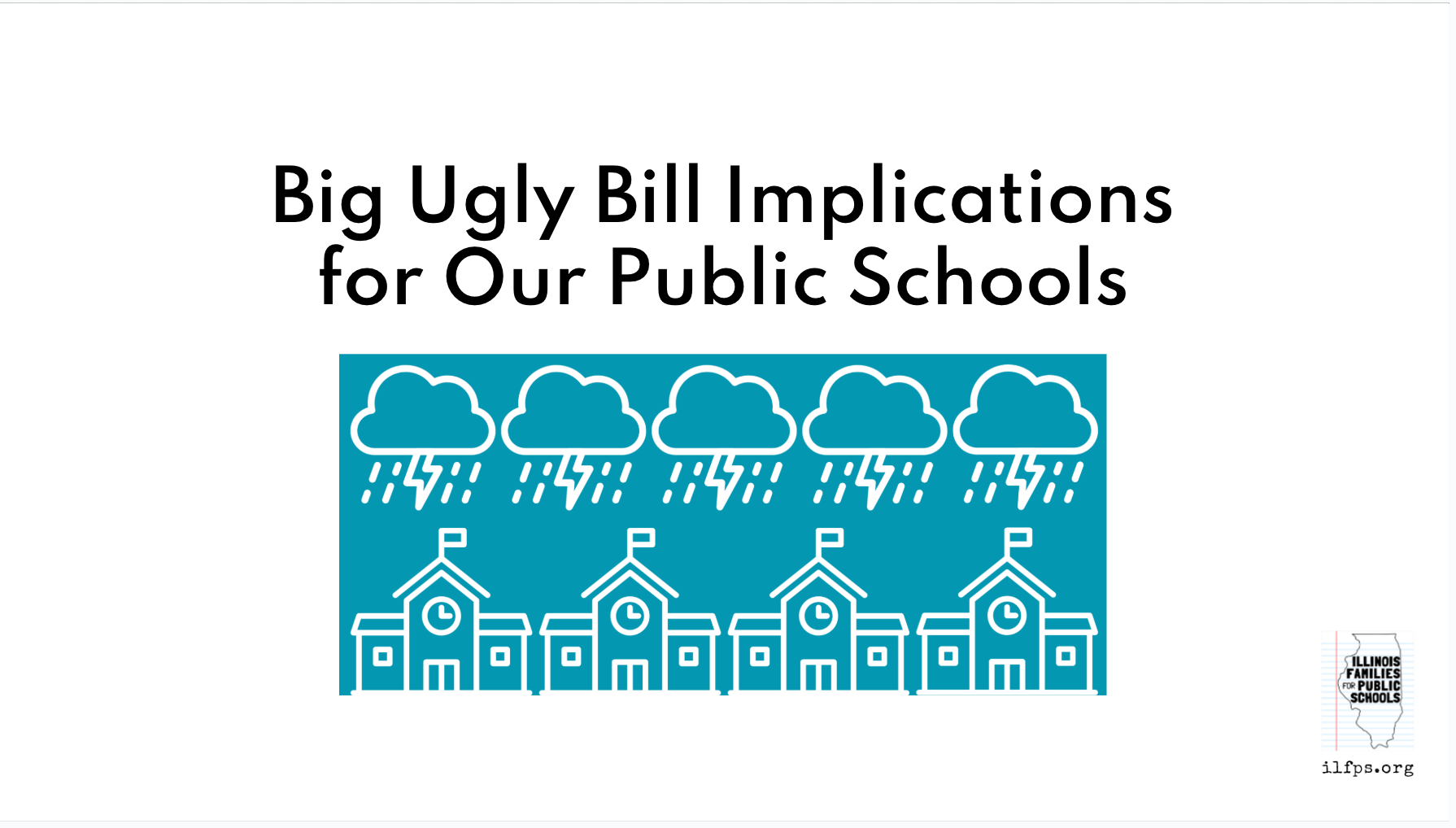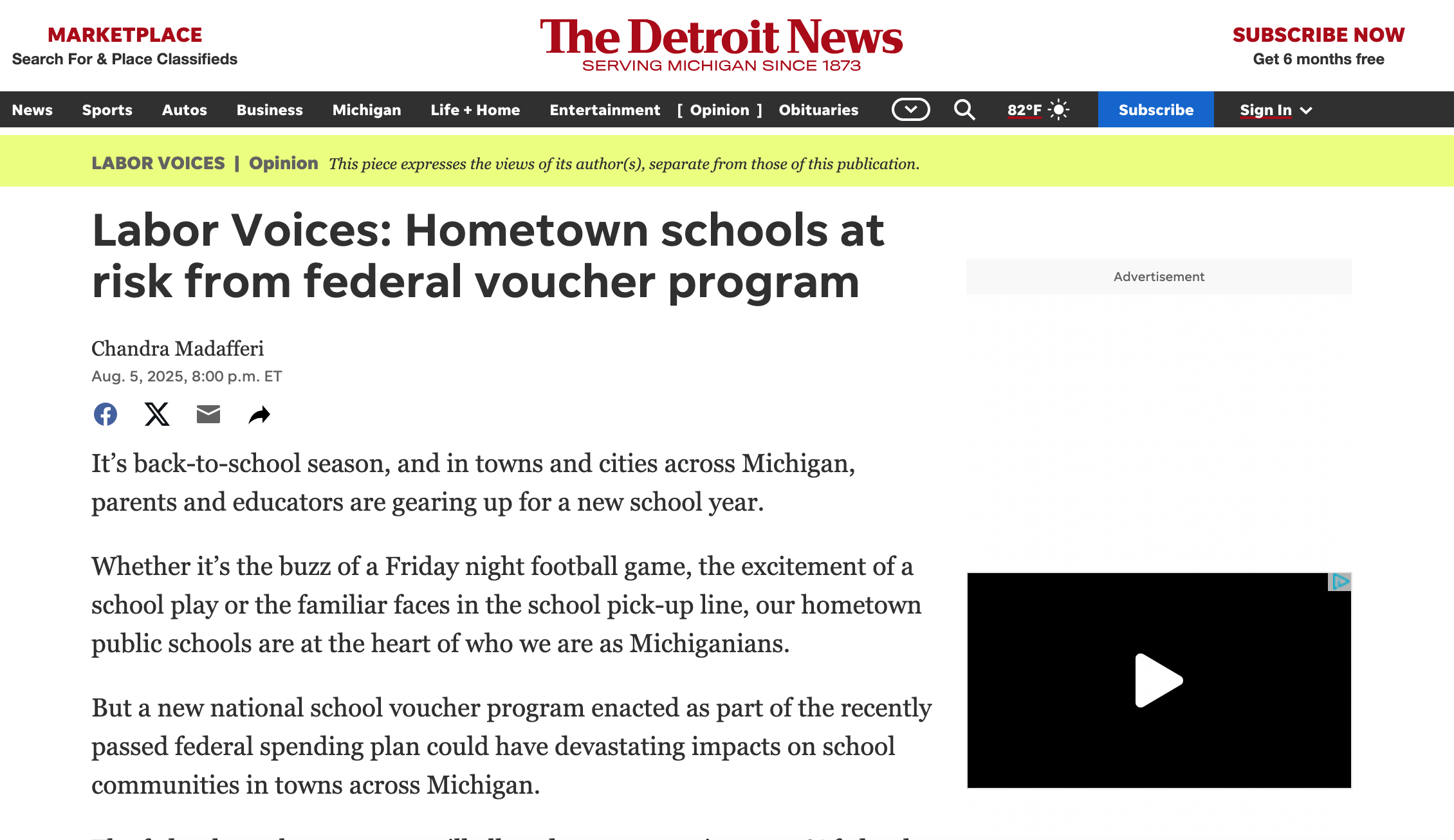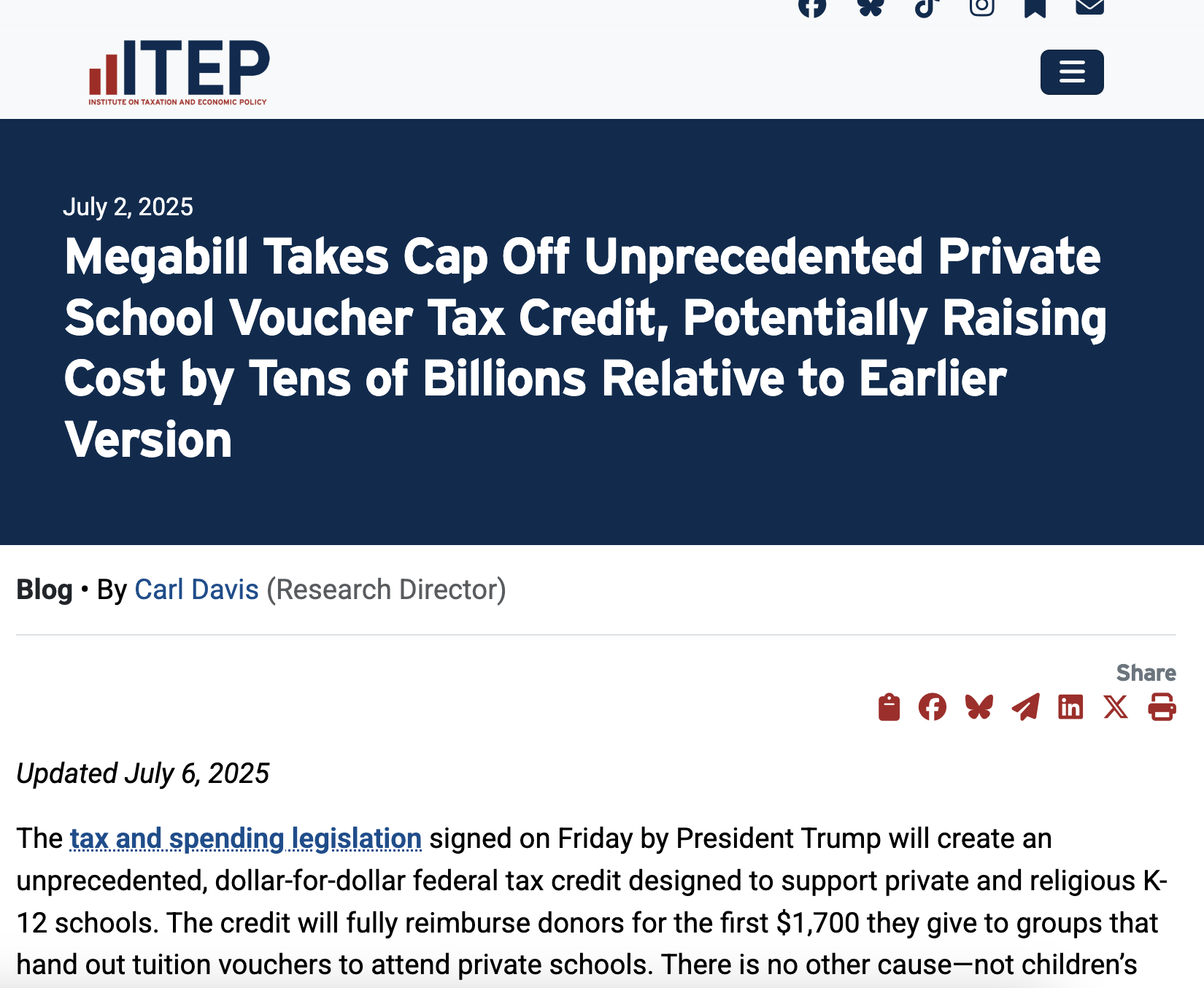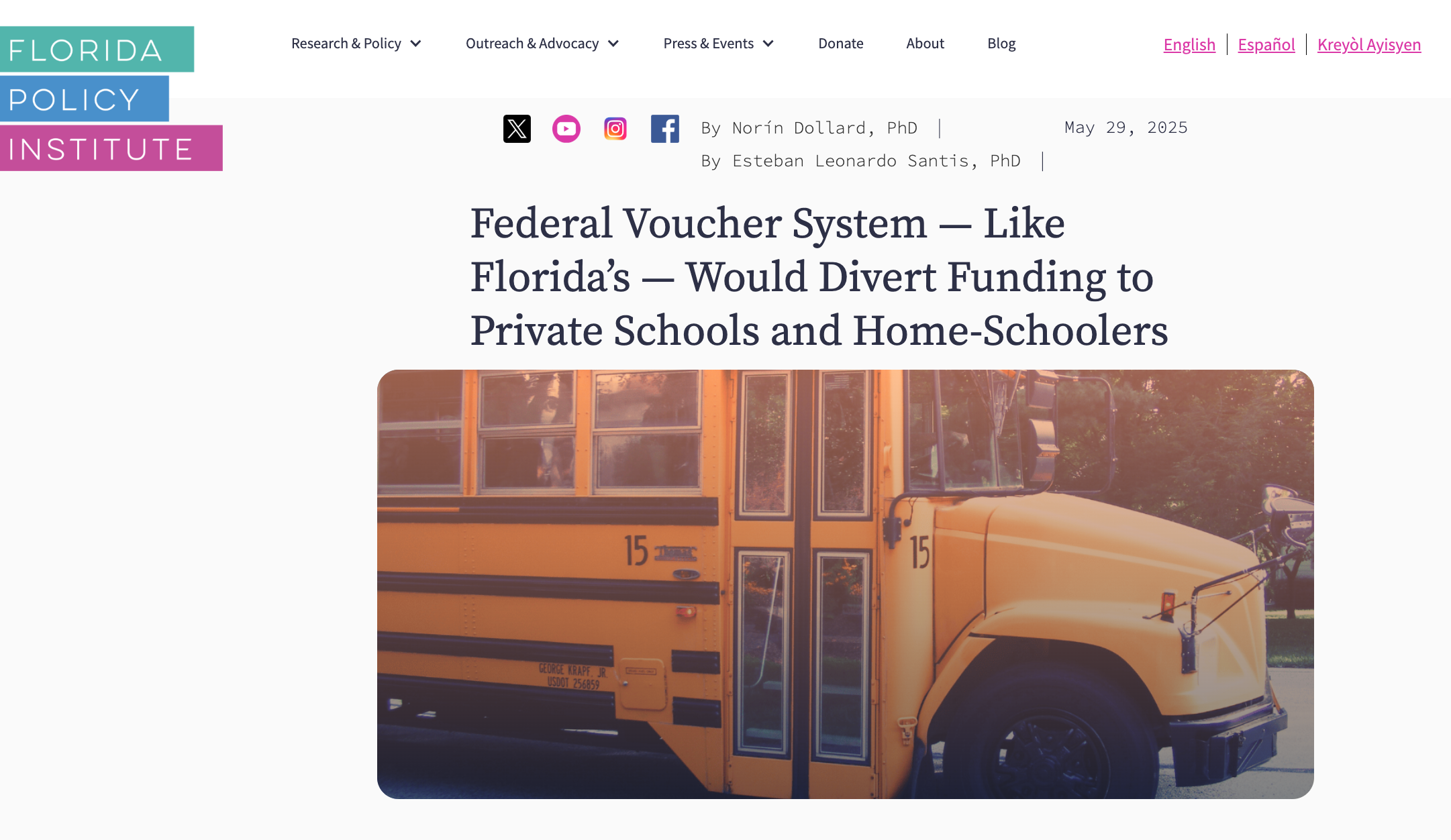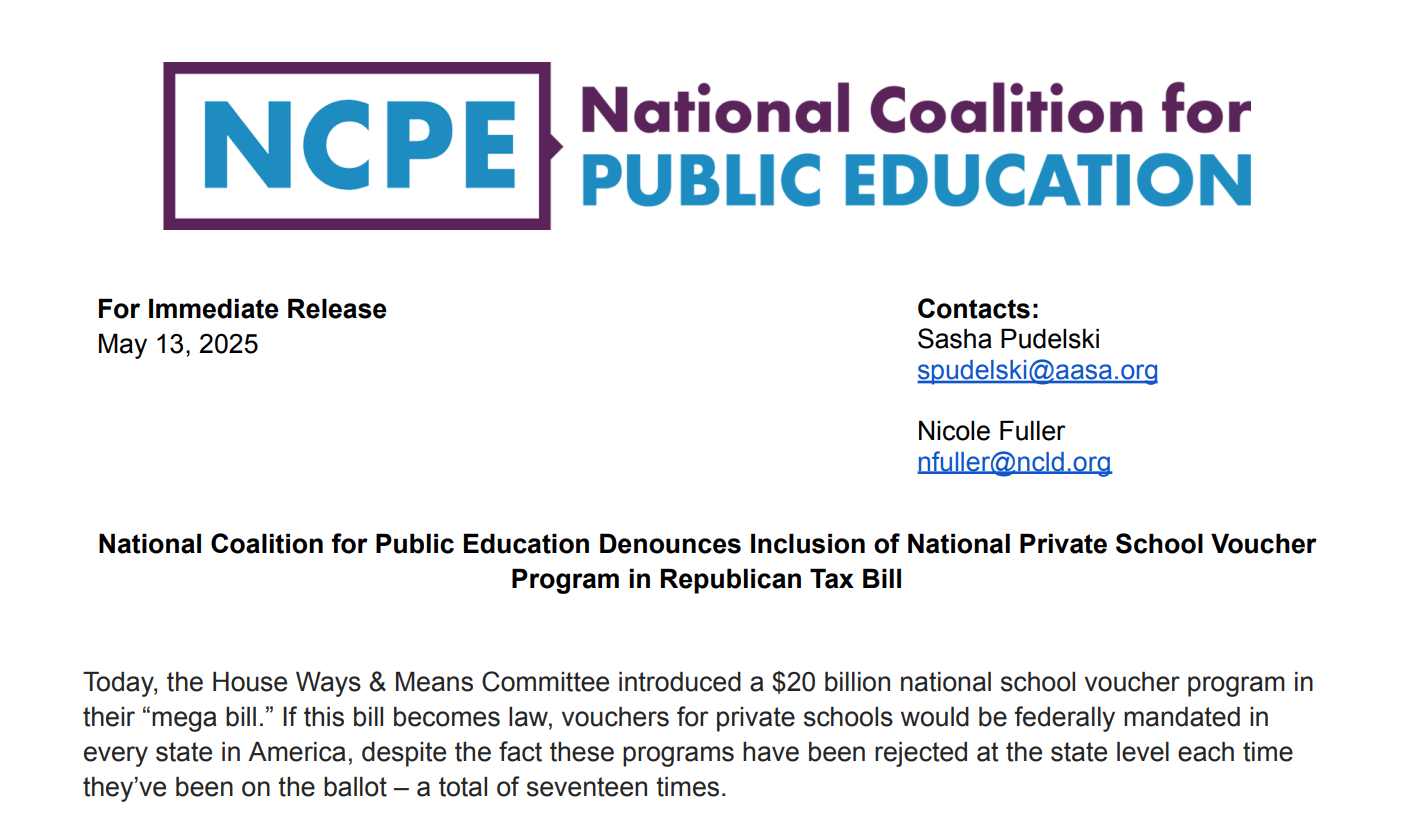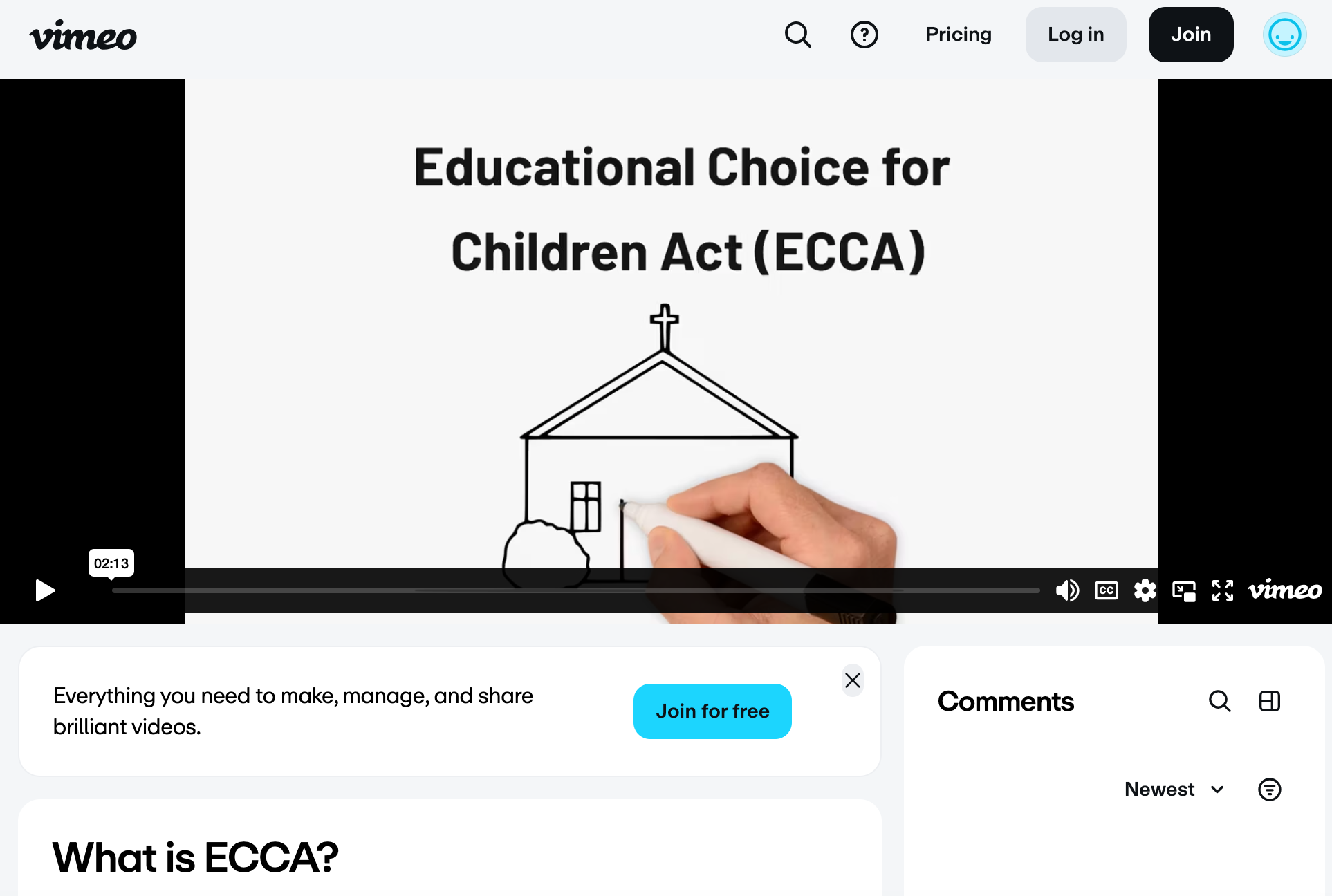
INSIGHT
Understanding bills, legislation, and litigation can help fight vouchers.
This topic equips advocates with key tools to challenge voucher programs effectively. Below, you’ll find real-time insights into ongoing legislative and legal battles across the country, crucial for formulating robust advocacy strategies.
It also features comprehensive resources and pivotal research on academic performance and cost impacts. Additionally, this topic connects to other topics like discrimination, accessibility, and the undermining of public schools, providing a holistic view to strengthen your work in support of public education.
The expansion of private school vouchers through the inclusion of a federal voucher scheme in the budget reconciliation bill passed in July is part of a broader assault on public education designed to privatize one of the most important common goods underpinning American democracy. Opting in to the federal program (the state’s choice), even to use voucher money for public education students, broadly endangers public education and opens the door to further voucher expansion, whether vouchers are already available in a given state or not.
These slides summarize the impact of the national voucher program and cuts to SNAP/Medicaid in the Trump administration's budget reconciliation bill.
The federal voucher program contained in the budget reconciliation bill passed in early July will divert federal tax dollars from the U.S. Treasury and from services, including public education, that Americans rely on, to give to private and religious schools that pick and choose whom they educate and openly discriminate against some students and families.
This week, Republican lawmakers are attempting to pass a budget reconciliation bill that pays for unprecedented handouts to the wealthiest Americans on the backs of cuts to programs that benefit most people. Hidden in this budget package before the House is a national private school voucher program funded through tax breaks for the wealthy that threatens to dismantle our system of public schools.
School-choice advocates won a major victory with President Trump’s tax megabill—but it comes with a catch.
The federal government will now subsidize private-school tuition, via unusually generous tax credits for donations to nonprofits. However, governors must opt into the program. Democratic-led states may reject it, derailing school-choice advocates’ goal for a nationwide effort.
Whether it’s the buzz of a Friday night football game, the excitement of a school play or the familiar faces in the school pick-up line, our hometown public schools are at the heart of who we are as Michiganians.
But a new national school voucher program enacted as part of the recently passed federal spending plan could have devastating impacts on school communities in towns across Michigan.
Senator Mazie K. Hirono (D-HI) led a spotlight forum focused on the harmful consequences the Republicans’ “Big Beautiful Bill” will have on students, parents, teachers, and schools across the country. Specifically, the forum highlights the school voucher-related provisions from the bill, which would divert billions of dollars in taxpayer funding to create the first ever national school voucher program.
The tax and spending legislation signed on Friday by President Trump will create an unprecedented, dollar-for-dollar federal tax credit designed to support private and religious K-12 schools. The credit will fully reimburse donors for the first $1,700 they give to groups that hand out tuition vouchers to attend private schools. There is no other cause—not children’s hospitals, veterans’ groups, or disaster relief—that taxpayers can contribute to and see the entire cost of their contribution bankrolled by the federal government.
A Franklin County judge has ruled that Ohio’s EdChoice school voucher programs are unconstitutional, delivering a victory to public school advocates and setting the stage for a likely appeal on a case over education funding in the state.
School vouchers allow families to use public funds to pay for their children’s private school tuition. School voucher programs enacted across the country – using tax credits, grants, and savings accounts to divert public funding to pay for private education – have consistently demonstrated that states with voucher programs tend to expand the programs over time. These expansions dramatically increase the amount of public funds diverted to private education while state investments in public education remain stagnant or decrease. Despite the numerous negative consequences of using publicly funded vouchers to pay for K-12 private education expenses,1 policy makers across the country continue to propose similar programs.
The reconciliation bill passed by the U.S. House of Representatives includes a federal tax credit voucher that would provide taxpayer-funded scholarships to pay for tuition at private schools and for home-schooled students. This $5-billion tax credit would divert funding that would otherwise go into federal coffers. This part of the reconciliation bill would make vouchers available to students in every state, even in those states where voters have opposed them like Kentucky, Colorado, and Nebraska, most recently.
Policymakers join parents, students, educators and allies to discuss how the national private school voucher program in the budget reconciliation bill would shift resources from public schools to wealthy people and private schools.
When is a “school choice” proposal not really about school choice? In the budget bill that Republicans rushed through the House on May 12, 2025, school choice is just a cover-up for tax relief for the rich.
In the “big, beautiful bill” federal lawmakers have tucked in a proposal that threatens the very heart of public education, not only across the country, but right here in Central Oregon. The Educational Choice for Children Act creates a backdoor voucher scheme across all states, enabling billions of taxpayer dollars to be funneled away from public schools and into private institutions that operate without oversight, transparency or public accountability.
Graphic on organizations opposing the federal voucher legislation.
On behalf of Advancement Project and 139 national, state, and grassroots racial justice, education justice, and other civil rights organizations, we write urging you to oppose any effort to authorize or create a national private school voucher program.
Trump's "big, beautiful bill" hides a massive tax loophole for billionaires that would practically pay them for "donating" money to pay for private school tuition of parents that may earn up to $500,000 per year - both increasing the deficit and weakening public schools. Tell your lawmaker to say NO to school vouchers.
The GOP’s Trump-backed “big, beautiful bill” has passed out of the House of Representatives, and taxpayers are rightfully giving lots of attention to features like the slashing of Medicaid and tax cuts for the wealthy. But buried within the bill is language that would create federal education private school vouchers and provide a tax dodge for the wealthy while eroding the public school system in favor of taxpayer-subsidized discrimination.
Americans United for Separation of Church and State, the American Civil Liberties Union, Education Law Center, and Freedom From Religion Foundation issued the following statement concerning the petitions for certiorari granted today by the U.S. Supreme Court in Oklahoma Statewide Virtual Charter School Board v. Drummond and St. Isidore of Seville Catholic Virtual School v. Drummond. The organizations represent faith leaders, public school parents, and public education advocates in a separate lawsuit to stop Oklahoma from sponsoring and funding St. Isidore of Seville Catholic Virtual School.
Today, the House Ways & Means Committee introduced a $20 billion national school voucher program in their “mega bill.” If this bill becomes law, vouchers for private schools would be federally mandated in every state in America, despite the fact these programs have been rejected at the state level each time they’ve been on the ballot – a total of seventeen times.
On behalf of Advancement Project and 93 national, state, and grassroots racial justice, education justice, and other civil rights organizations, we write in opposition to H.R. 833 and S. 292, the Educational Choice for Children Act (“ECCA”), which would create a nationwide private school voucher program in the form of a 100% tax break for the wealthy.
The tax plan moving through the U.S. House of Representatives includes a provision granting extraordinarily generous treatment to nonprofits that give out vouchers for free or reduced tuition at private K-12 schools. While the bill significantly cuts charitable giving incentives overall, nonprofits that commit to focusing solely on supporting private K-12 schools would be spared from those cuts and see their donors’ tax incentive almost triple relative to what they receive today. On top of that, the bill goes out of its way to provide school voucher donors who contribute corporate stock with an extra layer of tax subsidy that works as a lucrative tax shelter. Essentially, the bill allows wealthy individuals to avoid paying capital gains tax as a reward for funneling public funds into private schools.
A big Republican budget bill in Congress would establish a nationwide, federal school choice program — a potential political breakthrough that conservative lawmakers and advocates have discussed for years but which has consistently stalled.
Characterizing vouchers as an “entitlement program,” Hobbs said the state could spend more than $1 billion subsidizing private education in the upcoming fiscal year. The Democratic governor said those expenses could crowd out other budget priorities, including disability programs and pay raises for firefighters and state troopers.
Ohio’s top politicians want to spend an additional $432 million on private school tuition over the next two years, including a new voucher for unregulated religious schools. The House budget proposal, following the direction set by Gov. DeWine’s budget, continues to draw from a voucher playbook that disrupts and diminishes Ohio’s public schools, threatening the vast majority of Ohio children whose families rely on public schools to build their futures.
A video summarizing features of the Educational Choice for Children Act as of 2025.
Voucher programs, which divert scarce public resources to private schools, have been repeatedly shown to fund discrimination against students and families, fail to improve student outcomes, and undermine funding and resources for public schools, which serve the vast majority of children. They are also widely unpopular with voters. In fact, every time vouchers have been on the ballot, they have been rejected.
A fight to overturn Nebraska’s $10 million school voucher law has scrambled the state’s traditional political affiliations — and fired up Democrats over the possibility of beating back a cause that’s swept across conservative states.
Voters in Arizona in November rejected a plan to expand private-school vouchers in the state by 65 to 35 percent. The lopsided results might have been a surprise to school-voucher boosters, but they shouldn’t have been. Vouchers and other forms of private-school aid plans have been getting trounced at the ballot box since 1967.
We cannot afford to fund two school systems — both our public system and a private system — especially when one has such little accountability or measurable return on investment. Programs like this have decimated budgets in state after state, and we believe Nebraskans demand more responsible decisions be made with their tax dollars.


